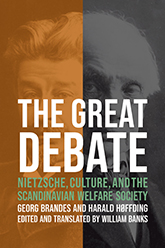|
The Great Debate
Nietzsche, Culture, and the Scandinavian Welfare Society
Georg Brandes and Harald Høffding
Edited and translated by William Banks
“Interpreters have described Nietzsche’s politics in many ways—proto-fascist, liberal, democratic, nonexistent—but the most accurate and perceptive term remains that of Nietzsche’s first great reader, the Danish critic Georg Brandes: ‘aristocratic radicalism.’ William Banks here translates Brandes’s pioneering essay of 1889 and the bitter exchange of articles it provoked between him and the Danish philosopher Harald Høffding over the relationship between Nietzsche and the burgeoning welfare politics of the era. The result is a much-needed recovery of Nietzsche’s early reception and an unanticipated intervention in contemporary debates about capitalism, culture, and the Nordic model of social democracy. We have much to thank Banks for: not only his assembling of this mind-blowing collection but also his learned introductory essay, which puts the players in their political context and brings them to our own.”
—Corey Robin, author of The Reactionary Mind
The first full translation of a crucial historical debate
In 1889, Danish literary critic Georg Brandes published “Aristocratic Radicalism: An Essay on Friedrich Nietzsche,” which transformed the as-yet-unknown German-Swiss philosopher into a European, and ultimately global, phenomenon. The article sparked a furious public debate between Brandes and a fellow Dane, philosopher Harald Høffding, who swiftly issued a rebuttal, “Democratic Radicalism: An Objection.” What began as a scholarly disagreement over Nietzsche’s philosophy rapidly spiraled into a sprawling contest of competing visions of society’s future, one radically aristocratic and the other radically democratic.
Marking the moment at which the uniquely Nordic concept of social democratic welfare was first contested in the public sphere, this debate provides insights into not only Nietzschean philosophy and its immediate reception but also the foundational concept of modern Scandinavian social, cultural, and political organization. This volume presents, for the first time in any language other than Danish, the debate in its entirety: three essays by Brandes and three by Høffding. A critical introduction by editor and translator William Banks explores the exchange in its context and convincingly argues that the principles contested by the two Danish luminaries still very much resonate in Western society today.
Georg Brandes (1842–1927) was a Danish intellectual, author, and critic, best known for his six-volume Main Currents.
Harald Høffding (1843–1931) was a Danish philosopher and professor at the University of Copenhagen.
William Banks is the editor and translator of Human Rights and Oppressed Peoples: Collected Essays and Speeches, by Georg Brandes.
Praise
“Brandes and Høffding’s debate concerning Nietzsche as an advocate of ‘aristocratic radicalism’ is of immense relevance and interest today, representing one of the first clashes between elitism and democratism. Banks’s critical introduction, extremely useful in situating the debate in its historical context, intriguingly shows how Nietzsche’s notion of the aristocrat has been taken over by the great celebrity entrepreneurs of our time.”
—Ishay Landa, author of Fascism and the Masses: The Revolt against the Last Humans, 1848–1945
“Banks’s opening essay persuasively makes the case for the relevance of the debate today. . . . An important and clarifying read for those interested in Nietzschean philosophy. More than just an important piece of history, Brandes and Høffding’s rivalry foreshadowed intellectual conflicts to come.”
—Jacobin
“Expertly edited and translated into English for an American readership. . . . A unique and seminal contribution.”
—Midwest Book Review
“A true gift not just to intellectual history and Nietzsche studies but to everyone interested in the perennial debates surrounding the role of culture and equality in the organization of society.”
—Critical Inquiry
“Makes a convincing case for why this long-forgotten polemic is of more than scholarly interest.”
—Compact
|

Larger images
January 2024
256 pp. 6 x 9
|

